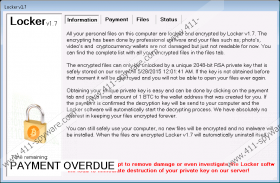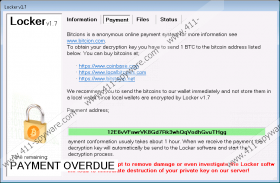Locker Virus Removal Guide
What would you do if your files were locked and you were asked to pay a ransom? This is what the victims of Locker Virus are dealing with. According to our malware analysts, this malicious ransomware can be spread using spam email attachments. If you download and open the fictitious attachment, you might execute Locker Virus without even realizing that. Immediately after this, your most sensitive personal files will be locked using the 2048-bit RSA private key. Usually, users immediately install automatic malware detection and removal software to delete Locker Virus hoping that this will save their files. Unfortunately, this is not a solution, and even if you perform the removal of Locker Virus successfully, your files will remain locked.
Just like Alpha Crypt, Tox Ransomware, or other malicious ransomware threats that users MUST remove, Locker Virus encrypts files only to force you into paying a ransom. This ransom is set at 1 Bitcoin, which is around 238 USD or 217 EUR. This sum is quite substantial, which is why most users think before they make the payment. If you have not removed Locker Virus yet, paying this ransom might seem like the only way to restore your files, but it is very risky. Our research team does not recommend paying the ransom just because it is difficult to say if schemers will hold their end of the deal. It is quite possible that your files will remain paralyzed even if you pay the Locker Virus ransom right away. Also known as Locker v1.7, Locker Virus is a malicious threat created by cyber criminals, and they might promise you anything just to get you to pay the ransom.
Once the file encryption is complete, you will be introduced to a notification suggesting that everything will go back to normal after you pay the ransom. This will be followed by an intimidating disclaimer indicating that your files will be lost if you delete Locker Virus (or Locker v1.7). This is supposed to stop you removing this malicious ransomware.
Warning any attempt to remove damage or even investigate the Locker software will lead to immediate destruction of your private key on our server!
If you have backed up your personal files, there is nothing you need to be afraid of. Even if your files were unlocked after you paid the money and removed Locker Virus, your money would be lost. If this is your situation, what you should do is install an automated malware remover that could delete Locker Virus from your operating system. Do not be intimidated by the threats expressed via the unreliable Locker v1.7 notification, because nothing will happen if you “investigate” this malware or try to remove it yourself. In fact, your might get into more trouble if you do not remove Locker Virus.
The guide below will help you remove Locker Virus from your operating system. Our researchers did not see this ransomware blocking executable files, which is why it is unlikely that you will have trouble launching your browsers or installing software. Of course, if you are having trouble with the removal, you might want contact us by posting your questions in the comments section below. Note that, if you need to, you can restart your PC in Safe Mode with Networking to install a reliable automatic malware removal tool. Fortunately, it is most likely that you will get away with these simple removal instructions.
How to delete Locker Virus
- Download an automatic malware remover from http://www.411-spyware.com/spyhunter .
- Follow the three-step installation guide.
- Using this remover, scan your operating system to detect malware.
- Click Fix Threats to remove Locker Virus and the associated computer infections.
Locker Virus Screenshots:



